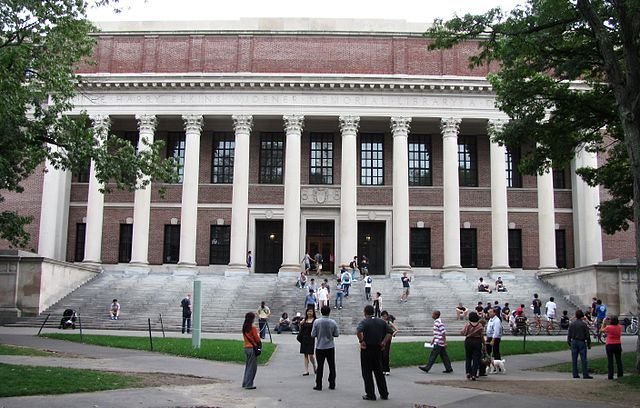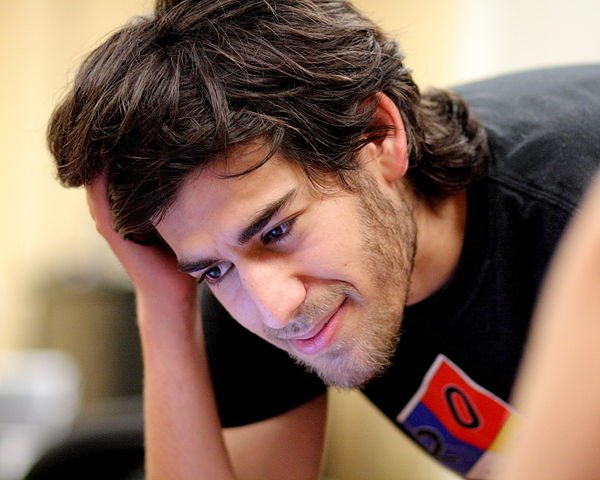The War on Open Science: Scientific Journals and the Research Racket
The War on Open Science
1
On the 11th of January 2013, Aaron Swartz, a 26 year old internet activist was found dead in his Brooklyn apartment. He had been arrested 2 years earlier and was facing a variety of charges relating to downloading a large number of academic journal articles from an MIT server with the aim of making them available online for free.
Swartz was facing up to 50 years in prison on what seemed to be an extreme over-reaction to the actions of a young man who was trying to further the cause of the open access movement. It seems the stress of the situation and the aggression of the prosecution of this case caused the young man to take his own life.
This was all for the idealism of wanting open access to academic information much of which is publicly funded. He wanted a better world where scientific progress would not be hindered by the vested interests of publishing companies and unfortunately he payed for this "great crime" with his life.
Similar to what Swartz was attempting, Sci-Hub is an online archive in Russia that shares research articles from many journals freely. It currently hosts over 48 million articles and is being sued by publishing giant Elsevier for copyright infringement. Due to it's location it has been sheltered from the kind of legal sanctions it would face if it were located in the west.
The final outcome of the legal action against them is anyone's guess but it is likely that the full force of the US government will be used to try to stop them, much in the way it was used against Swartz.
Anyone who dares to challenge the vested interests in this case is likely to have war declared against them by nation states who are more concerned about protecting these interests than their own public or indeed the use of their own funds.
In this case it was the US government but most other Western governments would do exactly the same.
Copyright infringement is seemingly one of the worst crimes you can commit. The fact that much of this material was created using public money doesn't seem to matter to those that pursue the infringers.
In the rest of this article I hope to briefly cover why I feel that this is basically a form of war on Science and scientific progress itself.
The Current Situation is a "Racket"
2
Three and a half years after Swartz' death we are still in a situation where the vast majority of scientific research is held captive behind pay walls. This is doubly scandalous given that a significant quantity of this research is publicly funded.
The US alone spent about $158 billion on publicly funded research in 2013. The vast majority of this research was published in journals that require payment to be viewed.
Even if one doesn't believe that all research should be freely available why should research that is funded by the public be closed and require payment to be reviewed?
This is equivalent to making the public pay twice for the same research.
All the funds from payment go entirely to the journals.
None of it goes towards the researchers, authors or back to the public to fund further research.
The journals are effectively being given free material to publish which they then monetise purely for their own gain.
They hold the copyright to all their published articles despite not being the original authors of them.
In what other situation can someone profit from selling and copyrighting a product which is made and tested almost entirely by others including the public itself?
It is complete insanity and it must stop.
Journals Have Costs But The Costs Are Inflated
Nobody is denying that the journals have costs but there are some misconceptions that relate to this.
Firstly the actual peer review process is carried out for free by academics (usually affiliated with Universities).
The journals themselves are only responsible for the costs of filtering submissions and the actual publication itself. These are known as APCs (Article Processing Charges).
When paid journals have been compared in price to open journals the APCs an be as much as 3 times higher.
Further a large chunk of these costs comes from the physical publication process something which does not apply to online publication.
The Scientific Method Depends on Openness
3
I won't bore you all by going into the details of the scientific method. The wikipedia article here covers it quite well and the image above (by ArchonMagnus) taken from it provides a nice summary of the basics.
The "other components section" in the second part of the article is important here and I have summarised the headings here as they are pretty self-explanatory:
"The scientific method also includes other components required even when all the iterations of the steps above have been completed:
- Replication
- External review
- Data recording and sharing"
All of the above components are necessary for real scientific progress.
We need replication to show that research findings are not spurious. External review is necessary to look for and exclude sources of error or poor research technique that the authors may have missed. Data recording and sharing is necessary for the same reason so that others can look at the raw data and perform their own analysis, looking for statistical anomalies etc.
This is all vital for the sustained and healthy progress of all scientific fields. Information must be open for true scientific progress to occur.
This lack of openness also leads to a slowing down of the scientific process. Papers are often delayed for months due to errors and rewrites. Many of these could be more quickly identified if papers are published in preliminary form online as pioneered by ArXiv.
The TLDR is that fighting open research is akin to declaring war on the scientific method itself.
The result is a system which is slower, has more flaws and potentially even shuts down certain potential avenues of advancement.
Whatever the journal publishers may say : paywalls = censorship.
Grey Research and Another Type of Censorship
4
Further there is a lot of unpublished "grey research" - these are papers that have no findings or have negative findings.
This kind of research is not considered "sexy" enough to be published by the major journals but from a purely scientific perspective it is just as important as the kind of studies that make headlines.
This is a kind of soft censorship.
At University I was shocked to see quite how much medical research in particular was consigned to archives where it would not see the light of day because it was not considered to be publishable. Not due to being improper research but because of just this sort of issue.
The failure to consider these kinds of studies leads to a significant skewing effect on the positive findings of those studies that do get published. The ultimate effect is that we do not get the big picture. This is particularly of concern in medical research where we only really see overtly positive studies.
Some research is also deliberately "shelved" if it doesn't agree with the agenda of one or more of the funding organisations. We have seen multiple scandals in relation to drug companies trying to hide certain research related to lucrative drugs as and side effects or adverse outcomes in the last couple of decades. Antidepressants and suicide risk is just one recent example.
It is impossible to say how many people may have died or been seriously harmed as a result of these kind of actions.
This is not a new thing and is more akin to a deliberate hard censorship.
This is one of the reasons why I believe all research particularly that with public safety/health implications should be made public.
Even Large Universities Can't Afford Access
5
In 2012 Havard University which is one of the worlds largest and wealthiest Universities announced that it could no longer continue affording to subscribe to all the journals which it had previously.
They cited multiple increases in journal prices in the preceeding years as the reason. The vast majority of journals are owned by 3 major publishers who offer them in bundles - much like cable TV packages. Universities must negotiate prices for bundles and there is no set price.
The vast monopolies created by these companies mean that there is little competition to lower prices.
Prices have continued to increase despite the fact that the internet has substantially lowered the costs of publishing and disseminating information. From 1984 to 2002 alone the cost increased by 600%.
This is particularly ridiculous when some of the research that the Universities must pay for is research they themselves conducted!
If large Universities can't afford this then there is no way that smaller institutions or indeed individual scientists or members of the public can afford to.
What is Open Access?
6
There are a number of slightly different definitions but the basic thrust of it is contained in this excerpt from the Budapest Open Access Initiative in February 2002 relating to online access to academic journal articles:
"There are many degrees and kinds of wider and easier access to this literature. By 'open access' to this literature, we mean its free availability on the public internet, permitting any users to read, download, copy, distribute, print, search, or link to the full texts of these articles, crawl them for indexing, pass them as data to software, or use them for any other lawful purpose, without financial, legal, or technical barriers other than those inseparable from gaining access to the internet itself. The only constraint on reproduction and distribution, and the only role for copyright in this domain, should be to give authors control over the integrity of their work and the right to be properly acknowledged and cited."
This is what Swartz and many others in the open access community have been trying to achieve.
Sadly it seems the main thing holding open access back is
- The "culture" within the scientific community which falsely believes that paid journals are a necessity.
- The vast lobbying power that the large consolidated multi-billion dollar publishing companies that own the big journals have which allows them to manipulate governments.
Can Blockchains Help?
I am not a programmer or coder so I must apologise if I am incorrect in my understanding here.
If a platform like Steemit can place large amounts of articles on a blockchain then I don't see why something similar could not be done for scientific research.
The decentralised nature of a blockchain would prevent censorship by vested interests (publishers, drug companies etc.).
If a culture could be created where all research was placed on an academic blockchain like this as a basic prerequisite then both issues of access and lost research could be substantially reduced.
As long as the blockchain remained in existence so would the research and all the associated data. Grey or hidden research could potentially be made a thing of the past.
Anyone could access any research data anywhere in the world. It would require a lot of work and a lot of cultural change but I believe it to be feasible.
Some Signs of Hope
7
There do appear to be some signs of change. Organisations such as PLoS (Public Library of Science), PubMed Central and ArXiv have embraced the open access ethos.
PLOS has a "no questions asked" waver for APCs to remove any financial barriers to publication. Some open access journals don't charge any fees at all.
Governments have also tried to embrace change to some degree. For example the US National Institute for Health (NIH) which accounts for 50% of government funding aims to make all research which it funds publicly available within a year.
The major publishers had asked for a longer embargo so whilst the delay is not ideal it can be seen as a victory of sorts if a mixed one at that.
Edit: @lemouth has also made me aware of the following iniative in the comments (his words):
"First, about the SCOAP3 initiative. It is a particle physics initiative where a fee is paid to all publishers. In exchange, all particle physics research articles are freely available to anyone. It is not really open access, but it is already a progress.
An interesting other example in particle physics is the JHEP journal which is a peer-reviewed journals that is entirely online and free.
You may also want to check the pevo project."
Conclusions
8
The lack of open access to scientific research is something that affects us all and not just individuals like the late Aaron Swartz.
A slow cultural change seems to be occurring within the scientific community however this change is not occurring quickly enough and there is significant resistance from the publishing companies whose profits depend on keeping the status quo.
Raising awareness of this issue through discussions and articles such as this is an important part of assisting this change.
My hope is that that we can have unfettered access to all publicly funded research at the very least within the next decade.
How many more lives could be saved and enhanced by the accleration of progress that could be accomplished by the adoption by Open Access and publicly available research?
Let us hope that Aaron Swartz did not die in vain and that the madness of the current system will be abolished.
That would be a fitting tribute to a young man whose only real crime was idealism.
THE END
I hope you found this article stimulating and easy to read. Please feel free to add your comments and continue the discussion below.
(Apologies in advance for any mistakes I may have missed.)
If you like my work please follow me and check out my previous work, photography and tutorials @thecryptofiend .
Credits:
Although I used a lot of my own personal experience and knowledge in writing this I also found a number of sources to be invaluable. The following articles are great sources of information and well worth reading for further information:
- Merkley, Ryan (2016) "You Pay to Read Research You Fund. That’s Ludicrous" : Wired Magazine 18th April 2016: Accessed 7th September 2016
- Mayyasi, Alex (2013)."Why Is Science Behind a Paywall?": Gizmodo. 13th May 2013: Accessed 7th September 2016
- Taylor, Mike (2016) "Hiding your research behind a paywall is immoral": The Guardian. 17th January 2013: Accessed 7th September 2016
I have also linked to relevant Wikipedia articles which I found useful in the actual body of the post.
- Photograph 1 of Aaron Swartz is CC by Daniel J. Sieradski and taken from Wikepedia.
- Photo 5 is Widener Library, Harvard University, Cambridge Massachusetts by John Phelan.
- Photo 8 is Aaron Swartz at Boston Wikipedia Meetup, 2009 08 18 - by Sage Ross.
- All other photographs are either licensed from IstockPhoto(4,7) or are public domain (2).








Hi,
First, thanks for putting all of this together! Maybe some additions you may consider to add to your post, if you want of course. There is no obligation ;)
First, about the SCOAP3 initiative. It is a particle physics initiative where a fee is paid to all publishers. In exchange, all particle physics research articles are freely available to anyone. It is not really open access, but it is already a progress.
An interesting other example in particle physics is the JHEP journal which is a peer-reviewed journals that is entirely online and free.
You may also want to check the pevo project.
And one of my major concern with a blockchain-based platform is the referral system. We are discussing this on the #pevo chat (please join us if you are interested).
PS: I know I already discussed this on my blog, on other blogs and on the #pevo channel, but I do not remember if you were around ;)
Thanks for the additions. No it wasn't me. I will check it out!
@lemouth is the #pevo channel in the regular Steemmit chat? I can't find it for some reason. I've downloaded the whitepaper for reading though.
You can access it here. It is part of the pevo chat ^^
OK thanks:)
I love to read articles that put together this well. Interesting, man! :)
Thank you:)
Yes, the scientific establishment is highly controlled and biased in many ways.
Someone from Russia decided to release tons of journals, and out them online for free. Open Access for the win!
Maybe you have heard of it?
http://sci-hub.bz/
Check it out! With science open to review from the public, maybe things can get back onto an objective unbiased course separate from establishment tentacles... LOL.
It's awesome. There is so much there.
Peace.
Yes. Thanks in fact I mention it in the first part of the article. We will have to see how long it can stay up though because the US government will be putting their full force behind shutting it down.
if it goes down, they'll probably switch servers. it wouldnt be the first time.
Probably but I think it is more likely the US government and the copyright holders will pursue the actual people behind it in order to intimidate them enough to close it down and deter others from doing the same. It will likely result in a cat and mouse game of the sort we have seen with Pirate Bay.
Added my 3 cents of upvote (yay, i can actually divert a not so trivial amount) but the idea that tax funded research is not public domain, is utterly offensive. I didn't know that this was related to why Aaron died, and I'd switch places with him in a heartbeat.
I believe not just science, but all art should be free to download. People worry that if you can just download it, the artists get no money.
But isn't obscurity worse than being unpaid?
I think so. Very much so. If nobody sees your work, whatever it is, how can they tell others. And then to add big onerous legal threats to it?
It is anti-science, anti-art, and anti-human to defend copyright.
If there is one thing that you can prove to yourself even, here on Steem, it is that the key to getting votes, is getting people's attention with votes and considered comments.
I think, when Steem matures a little more, it probably will have its' own scientific journal section, and gradually scientists will start to publish on it.
What good is genius if nobody knows you have it? What cost is there in relaying bits across the internet?
The sooner people, artists, writers, scientists, researchers, and the like, discover a platform like Steem, or Steem itself, the better. I have said this many times since I arrived, and I must repeat it:
All articles posted on Steem are public domain, you can be paid for publishing them, and they will probably be around forever, and nobody can stop it.
Sure, they are going to try, but i wish them luck in trying to find a way. It's one of my goals to build software that even allows people to help propagate the new blocks without storing the whole chain.
Thanks for your fantastic comments.
There is no way to prove it but his family certainly think that the aggressive way in which he was pursued for a minor crime is a major contributor to his suicide. The fact that he could have effectively ended up in prison for all or most of his life is insane for this kind of "crime".
I think the main objection is seeing others profiting from your own work but I think it can still benefit you if it is attributed. People will seek out the originator. They aren't stupid.
I agree with you. I would rather people saw my work whatever it was (as long as it was attributed). For me it is flattering if people use my work as long as they don't try to pass it off as their own. That is the insult.
That would be useful as the blockchain gets bigger. I think this is what ethereum is trying to achieve with sharding. It should help with scaling too in the future.
Yes, ethereum developers right in the whitepaper and in early articles discussed methods of allowing 'light nodes' to exist. It's very important, actually. A node can even store recent data, as well as propagate new blocks, without keeping the whole chain, and this boosts the resilience of the network.
In my opinion, in the future, people will look back at copyright and see it how I also see it: a scam. Attribution is the only value in a zero cost to copy system of media distribution.
It also heralds a switch from this broadcast, centralisation of media distribution towards various scales of performance becoming more socially important. It's already happening. Bands are starting to issue their own, often free recordings, as a way to pull more punters into their gigs.
Artists make the most from gigs, and the more they can organise them as well, the better. So the marketing being cheap works in their favour! Make the fans, the marketing department. It's not like they aren't already.
Sooner or later, people are going to realise that we don't need big brother to make our fans pay us. In fact, by doing this, we limit our fanbase.
@thecryptofiend
I agree with the general idea of your article. I have a different take on the matter though.
-1- Aaron Swartz stole. Really. He stole and there is no way to robinhood-justify this
-2- Academia is rotten to the core. It works much like kingship. One has to die in order for someone else to fill the position. There is a monopoly to knowledge. It's much like upvoting in here. You upvote the old whale in order to get more rewards. quality doesn't matter. this is idiotic.
-3- Most research is downright bullshit and even they themselves admit it. Nobody cares about quality anymore (and doing actual science) but rather care about the publishing number and measuring dick size. Really, number of publications matter more than quality of research. Ask any academic.
-4- Most research is not even research. Rarely a scientific research can be falsifiable and replicable.
http://journals.plos.org/plosmedicine/article?id=10.1371/journal.pmed.0020124
-5- Fuck academia. Fuck the public funding. Fuck the relic professors that have created a circle jerk. Nobody can spoil open source projects. If more people join the movement then let it be.
-6- Universities are as expired as churches. Knowledge can be found for free, online. Anyone can contact a research and if it works then it can be monetised. If its not, no amount of peer review is going to make it stick. this is the biggest difference of the real world vs the safe-space academic world.
Stealing something by copying it? Is that like taking a photo with no flash of the monalisa, with a 50MP camera on a tripod? Did the original disappear? I am tired of hearing this horseshit that copying (with attribution) is theft. It is patently not. And a patent is another example of a theft, because, and oddly enough, historically (like how secret shares was devised by two mathematicians at the same time) it is rare a new idea is given by the maker, to only one. Sure, register a trademark. Claim first dibs on some specific original idea, in it's whole entirety. But who benefits from creating this atmosphere of fear around creative work?
It is an absolute crime that anything paid for by the crime of extortion, i mean by taxes, is not already public domain, and even the download is funded (what, $0.00001 per copy, right?).
I look forward to the day when people realise what an abject racket is copyright, and it's just one of the many branches of the Mafia, ahem, did I say mafia? No, I meant Government.
Controversial views as always. Thanks for commenting:)
You had me at "war". Just point me in the right direction.

Lol.
One should question the motive of keeping information behind a lock and key, even if it is accessible through payment. Especially if it's accessible through payment.
Thank you for raising awareness on this idea. You've put a lot into this article and it really shows.
You got it right. "Information wants to be free" the mantra begun in the 60's that technology could be liberating is finally getting it's real chance with advanced crypto and blockchain. I hope I live to see it come to fruition that anybody wanting to be taken seriously can't steel their material away behind a paywall.
I think that at the rate of advancing technologies and innovations, it is highly likely that I will see it in my life as I am just under 30 years old. I have a good 60 years of life left. The amount of advances made in the past 200 years compared to the past 2000 is phenomenal and only continues to increase in speed.
Imagine how much farther we would be should information never have been held behind a lock and key!
Exactly. Thank you:)
I don't see why the blockchain can't replace many sectors. Ira Miller said it best.

Great quote:)
Superb article, interesting and gripping, thanks
Thanks glad you liked it:)
Superb and detailed article, buddy. Great content. It's a shame Swartz had to die for his beliefs.
Thanks yes it is very sad.